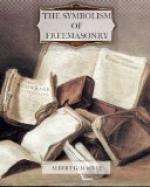Thus, if we seek the origin and first beginning of the Masonic philosophy, we must go away back into the ages of remote antiquity, when we shall find this beginning in the bosom of kindred associations, where the same philosophy was maintained and taught. But if we confound the ceremonies of Masonry with the philosophy of Masonry, and seek the origin of the institution, moulded into outward form as it is to-day, we can scarcely be required to look farther back than the beginning of the eighteenth century, and, indeed, not quite so far. For many important modifications have been made in its rituals since that period.
Having, then, arrived at the conclusion that it is not the Masonic ritual, but the Masonic philosophy, whose origin we are to investigate, the next question naturally relates to the peculiar nature of that philosophy.
Now, then, I contend that the philosophy of Freemasonry is engaged in the contemplation of the divine and human character; of god as one eternal, self-existent being, in contradiction to the mythology of the ancient peoples, which was burdened with a multitude of gods and goddesses, of demigods and heroes; of man as an immortal being, preparing in the present life for an eternal future, in like contradiction to the ancient philosophy, which circumscribed the existence of man to the present life.
These two doctrines, then, of the unity of God and the immortality of the soul, constitute the philosophy of Freemasonry. When we wish to define it succinctly, we say that it is an ancient system of philosophy which teaches these two dogmas. And hence, if, amid the intellectual darkness and debasement of the old polytheistic religions, we find interspersed here and there, in all ages, certain institutions or associations which taught these truths, and that, in a particular way, allegorically and symbolically, then we have a right to say that such institutions or associations were the incunabula—the predecessors—of the Masonic institution as it now exists.
With these preliminary remarks the reader will be enabled to enter upon the consideration of that theory of the origin of Freemasonry which I advance in the following propositions:—
1. In the first place, I contend that in the very earliest ages of the world there were existent certain truths of vast importance to the welfare and happiness of humanity, which had been communicated,—no matter how, but,—most probably, by direct inspiration from God to man.
2. These truths principally consisted in the abstract propositions of the unity of God and the immortality of the soul. Of the truth of these two propositions there cannot be a reasonable doubt. The belief in these truths is a necessary consequence of that religious sentiment which has always formed an essential feature of human nature. Man is, emphatically, and in distinction from all other creatures, a religious animal. Gross commences his interesting




